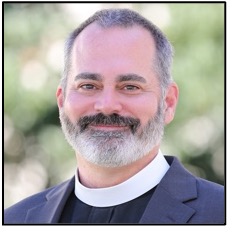Bulletin Insert: Reflections on the Resurrection: Week 4 – April 21, 2024

During the Easter season, Sermons That Work is pleased to present reflections from some of the newest bishops of The Episcopal Church on the resurrection of our Lord. Check back each week for a brief exploration of how Jesus Christ’s rising from the grave changes everything. To listen to this reflection, scan the QR code on this page and subscribe to the Sermons That Work podcast.
During Eastertide, we lift high the good news that God’s saving work in human history has been accomplished solely through the life, death and Resurrection of Jesus. We proclaim that in Christ, God was reconciling the world to himself, not counting our trespasses against us, and that salvation is not earned by any human effort at all but received by faith in the finished work of Christ.
But let’s be honest: Sometimes this all sounds too good to be true – a well-meaning sentiment, but not terribly helpful when confronted with day-to-day reality. In the face of darkness, despair and death, we need resurrection, not sentiment.
We know all too well that life is filled with suffering. Some of us feel paralyzing guilt and condemnation because of the sins we’ve committed. Some of us feel overwhelming shame because of the sins committed against us. Some of us feel despair because of the impulses and addictions that seem to have power over us. Some of us are shrouded in the darkness of depression. Some of us are suffocated by grief because death has taken a child, a spouse, a parent or a friend.
Rather than minimize darkness, despair and death, Jesus experiences it and comforts us in it right now. The one who stepped out of the grave on Easter morning has the last word. We’re comforted knowing that Jesus Christ, God himself, knows what it’s like to suffer, and that his Resurrection is a guarantee of our future resurrection to eternal life. Because Jesus conquered death, we know that darkness is not the end of the story or the last word on us. The risen Christ says the last word on us is “hope.”
The Bible teaches that our suffering is a place to experience God’s sustaining grace in our weakness (2 Cor. 1:8-9, 12:9-10). Grief, Scripture clearly says, is a natural response when we experience loss, but it can be tempered by the good news of Christ’s Resurrection. Because of his victory over death, all threats against us are tamed. He conquers all our enemies: Satan, sin, hell and the grave. The Resurrection not only readjusts our horizon, but it completely transforms our understanding of the future as well.
Where darkness, despair and death had reigned, Jesus breaks in with light, liberation and love. A picture of this comes from Robert Louis Stevenson, the author of “Treasure Island” who lived in Scotland in the 19th century. As a boy, he and his family lived on a hillside overlooking a small town. He was intrigued by the work of the old lamplighters, who went about with ladders and torches, lighting the streetlights for the night.
One evening, as Robert stood watching with fascination, his nurse asked him, “Robert, what in the world are you looking at out there?” With great excitement, he exclaimed, “Look at that man! He’s punching holes in the darkness!”
Jesus Christ, “the light of the world” (John 8:12), has entered our suffering to punch holes in the darkness and lead us into the dawn of his grace, love and eternal life. While it is true that in the midst of life, we are in death, what’s more true is that, because of the Resurrection, in the midst of death, we are in life.

The Rt. Rev. Dr. Justin S. Holcomb is the bishop of the Diocese of Central Florida, a seminary professor, and an author or editor of more than twenty books on theology, abuse, and biblical studies. This reflection was adapted from Bishop Holcomb’s Easter sermon at the Cathedral Church of St. Luke, Orlando, March 31, 2024.
21 de abril de 2024 – Pascua 4 (B)
Semana 4: Reflexiones sobre la Resurrección
Durante el tiempo de Pascua, Sermones que iluminan se complace en presentar las reflexiones de obispos de la Iglesia Episcopal sobre la resurrección de nuestro Señor. Revise cada semana para una breve exploración de cómo la resurrección de Jesucristo de la tumba lo cambia todo.
Durante el tiempo pascual, proclamamos la buena noticia de que la obra salvadora de Dios en la historia de la humanidad se ha llevado a cabo únicamente mediante la vida, la muerte y la resurrección de Jesús. Proclamamos que, en Cristo, Dios reconcilió al mundo consigo mismo, sin tener en cuenta nuestros pecados, y que la salvación no se gana con ningún esfuerzo humano, sino que se recibe por la fe en la obra consumada de Cristo.
Pero seamos sinceros: a veces todo esto suena demasiado bien para ser verdad, un sentimiento bienintencionado, pero no muy útil cuando nos enfrentamos a la realidad cotidiana. Ante la oscuridad, la desesperación y la muerte, necesitamos resurrección, no sentimientos.
Sabemos muy bien que la vida está llena de sufrimiento. Algunos sentimos una culpa y una condena paralizantes por los pecados que hemos cometido. Algunos sentimos una vergüenza abrumadora por los pecados cometidos contra nosotros. Algunos sentimos desesperación por los impulsos y adicciones que parecen tener poder sobre nosotros. Algunos estamos envueltos en la oscuridad de la depresión. Algunos estamos sofocados por el dolor porque la muerte se ha llevado a un hijo, un cónyuge, un padre o un amigo.
En lugar de minimizar la oscuridad, la desesperación y la muerte, Jesús las experimenta y nos consuela en ellas ahora mismo. El que salió de la tumba en la mañana de Pascua tiene la última palabra. Nos consuela saber que Jesucristo, Dios mismo, sabe lo que es sufrir, y que su Resurrección es garantía de nuestra futura resurrección a la vida eterna. Porque Jesús venció a la muerte, sabemos que la oscuridad no es el final de la historia ni la última palabra sobre nosotros. Cristo resucitado dice que la última palabra sobre nosotros es “esperanza”.
La Biblia enseña que nuestro sufrimiento es un lugar para experimentar la gracia sustentadora de Dios en nuestra debilidad (2 Cor. 1:8-9, 12:9-10). El dolor, dice claramente la Escritura, es una respuesta natural cuando experimentamos una pérdida, pero puede atemperarse con la buena noticia de la Resurrección de Cristo. Gracias a su victoria sobre la muerte, todas las amenazas contra nosotros quedan amansadas. Él vence a todos nuestros enemigos: Satanás, el pecado, el infierno y la tumba. La Resurrección no sólo reajusta nuestro horizonte, sino que también transforma por completo nuestra comprensión del futuro.
Donde reinaban la oscuridad, la desesperación y la muerte, Jesús irrumpe con la luz, la liberación y el amor. Robert Louis Stevenson, el autor de “La isla del tesoro”, que vivió en Escocia en el siglo XIX, nos ofrece una imagen de ello. De niño, él y su familia vivían en la ladera de una colina que dominaba una pequeña ciudad. Le intrigaba el trabajo de los viejos faroleros, que iban con escaleras y antorchas encendiendo las farolas por la noche.
Una noche, mientras Robert observaba fascinado, su enfermera le preguntó: “Robert, ¿qué demonios estás mirando ahí fuera?”. Con gran emoción, exclamó: “¡Mira a ese hombre! Está haciendo agujeros en la oscuridad”.
Jesucristo, “la luz del mundo” (Juan 8:12), ha entrado en nuestro sufrimiento para abrir agujeros en la oscuridad y conducirnos al amanecer de su gracia, su amor y su vida eterna. Si bien es cierto que, en medio de la vida, estamos en la muerte, lo que es más cierto es que, gracias a la Resurrección, en medio de la muerte, estamos en la vida.

El Reverendísimo Dr. Justin S. Holcomb es obispo de la Diócesis de Florida Central, profesor de seminario y autor o editor de más de veinte libros sobre teología, abusos y estudios bíblicos. Esta reflexión fue adaptada del sermón de Pascua del Obispo Holcomb en la Iglesia Catedral de San Lucas, Orlando, el 31 de marzo de 2024.
Don’t forget to subscribe to the Sermons That Work podcast to hear this sermon and more on your favorite podcasting app! Recordings are released the Thursday before each liturgical date.
Receive Free Weekly Sermons That Work Resources!


